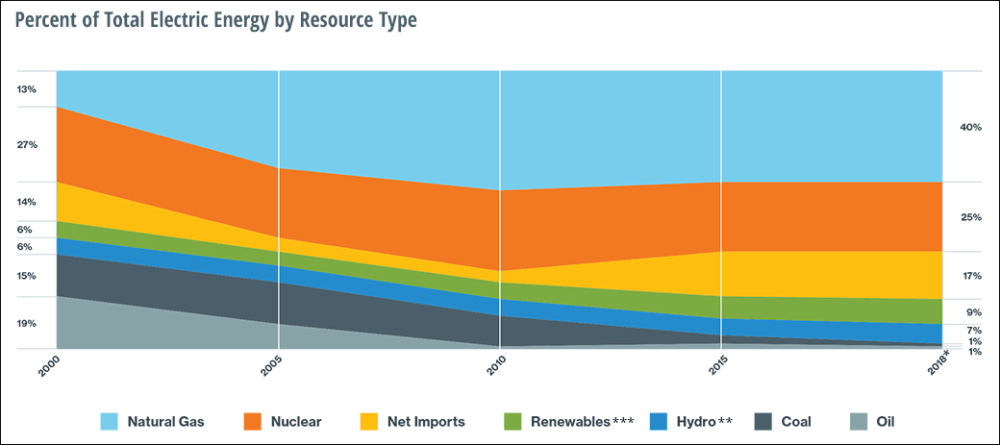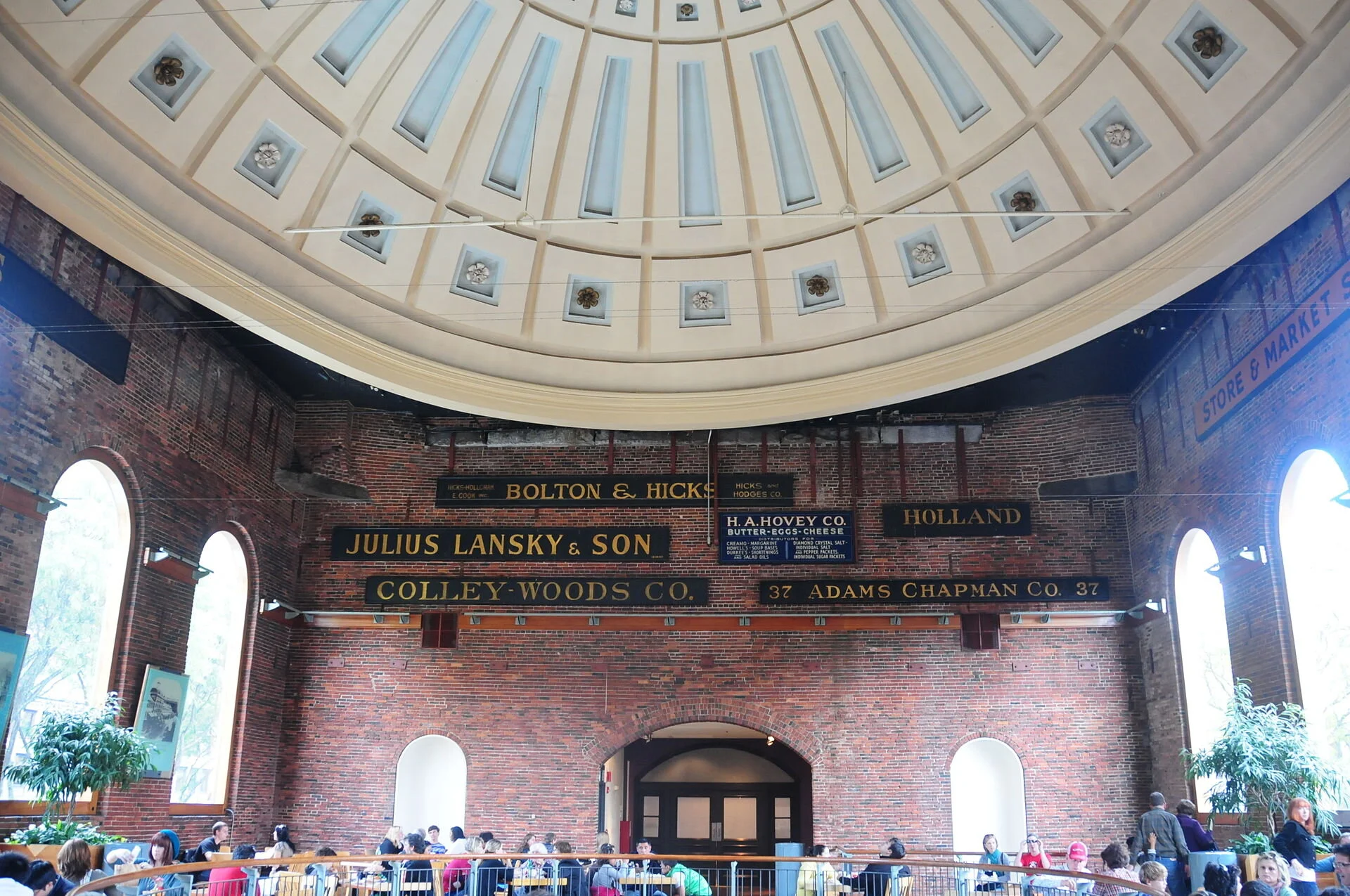Llewellyn King: Utilities face more demand, less generation
How New England's energy mix has changed since 2000 -- before the closure of the Pilgrim Nuclear Power Plant, on the coastline in Plymouth, Mass., which was shut in 2019.
— — Courtesy of ISO New England
The Pilgrim Nuclear Power Plant, with the Manomet Hills behind.
WEST WARWICK, R.I.
America’s electric utilities are facing revolutionary changes as big as any they have faced since Thomas Edison got the whole thing going in 1882.
Between now and 2050 – just 28 years -- practically everything must change: The goal is to reach net zero, the stage at which the utilities stop putting greenhouse gases, especially carbon dioxide, into the atmosphere.
But in that same timeframe, the demand for electricity is expected to at least double and, according to some surveys, to exceed doubling as electric vehicles replace fossil-fueled vehicles and as other industries, such as cement and steel manufacturing, along with general manufacturing, go electric.
Just eliminating fossil fuel alone is a tall order -- 22 percent of the current generating mix is coal, and 38 percent is natural gas. Half of the generation will, in theory, go offline while demand for electricity soars.
The industry is resolutely struggling with this dilemma while a few, sotto voce, wonder how it can be achieved.
True, there are some exciting technological options coming along: hydrogen, ocean currents, small modular nuclear reactors, so-called long-drawdown batteries, and carbon capture, storage and utilization. The question is whether any of these will be ready to be deployed on a scale that will make a difference by the target date of 2050.
There are other schemes -- still just schemes -- to use the new electrified transportation fleets as a giant national battery. The idea is that your electric vehicle will be charged at night, or at other times when there is an abundance of power, and that you will sell the power back to the utility for the evening peak, when we all fire up our homes and electricity demand zooms.
This is just an idea and no structure for this partnership between consumer and utility exists, nor is there any idea of how the customer will be compensated for helping the utility in its hours of need. It is hard to see how there will be enough money in the transaction to cause people to want to help the utility because besides the cost of charging their vehicles, the batteries will deteriorate faster.
The ongoing digitization of utilities means that they will be able to better manage their flows and to practice more of what is called distributed energy resources (DER), which can include such things as interrupting certain nonessential users by agreement.
David Naylor, president of Rayburn Electric Cooperative, bordering Dallas, says that DER will save him as much as 10 percent of Rayburn’s output, but not enough to take care of the escalating demand.
Like many utilities, Rayburn is bracing for the future, expecting to burn more natural gas and add solar as fast as possible. They are also upgrading their lines, called connectors, to carry more electricity.
The latter highlights another major challenge for utilities: transmission.
The West generates plenty of renewable power electricity during the day, some of which goes to waste because it is available when it isn’t needed in the region, but when it would be a boon in the East.
The simple solution is to build more long-distance transmission. Forget about it. To get the many state and local authorizations and to overcome the not-in-my-backyard crowd, most judge, wouldn’t be possible.
Instead, utilities are looking to buttress the grid and move power over a stronger grid. In fact, there isn’t one grid but three: Eastern, Western and the anomalous Texas grid, ERCOT, which is confined to that state and, by design, poorly connected to the other two, although that may change.
Advocates of this strengthening of the grid abound. The federal government is on board with major funding. Shorter new lines between strong and weak spots would go a long way to making the movement of electricity across the nation easier. They would also move the nation nearer to a truly national grid. But even building short electric connections of a few hundred miles is a fraught business.
The task of the utilities -- there are just over 3,000 of them, mostly small -- is going to be to change totally while retooling without shutting off the power. The car companies are totally changing, too. But they can shut down to retool. Not so the utilities. Theirs must be revolution without disruption: the light that doesn’t fail.
Llewellyn King is executive producer and host of White House Chronicle, on PBS. His email is llewellynking1@gmail.com, and he’s based in Rhode Island and Washington, D.C.
Llewellyn King: The new normal will take time, not politics
WEST WARWICK, R.I.
Loud detonations are going off in the economy. When the debris settles, new realities will emerge. We won’t return to the status quo ante, although that is what politicians like to promise.
After great cataclysmic events — wars, natural disasters or the impact of new technologies — we need to acknowledge the realities and find the opportunities.
The inflation that is shaking the world is the inflammation that arises as markets seek equilibrium — as markets always do.
The greatest disrupter has been the COVID-19 pandemic, and the ramifications of how it has reshaped economies and societies are still evolving. For example, will we need as much office space as we did pre-pandemic? Is the delivery revolution the new normal?
Russia’s war in Ukraine has added to the pandemic-caused changes before they have fully played out. They, in turn, were playing out against the larger imperatives of climate change, and the sweeping adjustments that are underway to head off climate disaster.
Some political actions have exacerbated the turbulence of the economic situation, but they aren’t the root causes, just additional economic inflammation. These include former president Donald Trump’s tariffs and President Biden’s mindless moves against pipelines, followed by attempts to lower gasoline prices, or wean us from natural gas while supplying more natural gas to Europe.
In the energy crisis (read shortage) of the 1970s, I invited Norman Macrae, the late, great deputy editor of The Economist, to give a speech at the annual meeting of The Energy Daily, which I had created in 1973 — and which was then a kind of bible to those interested in energy and the crisis. Macrae, who had a profound influence in making The Economist a power in world thinking, shared a simple economic verity with the audience: “Llewellyn has invited me here to discuss the energy crisis. That is simple: the consumption will fall, and the supply will increase. Poof! End of crisis. Now, can we talk about something interesting?”
Of the many, many experts I have brought to podiums around the world, never has one been as warmly received as Macrae. Not only did the audience stand and applaud, but many also climbed on their chairs and applauded. I’m not sure Washington’s venerable Shoreham Hotel had ever seen anything like that, at least not at a business conference.
In today’s chaotic situation with political accusations clashing with supply realities, the temptation is to find a political fix while the markets seek out the new balance. Politicians want to be seen to do something, no matter what, and before it has been established what needs to be done.
An example of this was Biden increasing the allowed amount of ethanol derived from corn and added to gasoline. It is so small an addition that it won’t affect the price at the pump, but it might affect the price of meat at the supermarket. Corn is important in raising cattle and feeding large parts of the world.
There is a global grain crisis as a result of Russia’s war in Ukraine, which is a huge grain producer. Parts of the world, especially Africa, face starvation. The last thing that is needed is to sop up American grain production by burning it as gasoline.
We are, in the United States, gradually moving from fossil fuels to renewables, but this is going to move our dependence offshore, and has the chance of creating new cartels in precious metals and minerals.
Essential to this move is the lithium-ion battery, the heart of electric vehicles and battery storage for renewables, and its tenuous supply chain. Lithium has increased in price nearly 500 percent in one year. It is so in demand that Elon Musk has suggested he might get into the lithium mining business.
But lithium isn’t the only key material coming from often unstable countries: There is cobalt, mostly supplied from the Democratic Republic of the Congo; nickel, mostly sourced in Indonesia; and copper, where supply comes primarily from Chile.
Across the board, supplies will increase, and demand will decline. Equilibrium will arrive, but vulnerability won’t be eliminated. That is an emerging supply chain constant as the economy shifts to the new normal.
The aftershocks of the pandemic and Russia’s war in Ukraine will be felt for a long time — and endured as inflation.
On Twitter: @llewellynking2
Llewellyn King is executive producer and host of White House Chronicle, on PBS. He’s based in Rhode Island and Washington, D.C.
Promote what you're good at
Dome Inside Boston’s Quincy Market on a pre-pandemic day, serving as as the seating area for the food court at the complex. The sign boards of old businesses decorate the walls.
— Photo by Jyothis
Adapted from Robert Whitcomb’s “Digital Diary,’’ in GoLocal24.com
It’s happy news that Marsella Development Corp. wants to establish a (Boston’s) Quincy Market/Faneuil Hall complex-style food hall on the ground floor of One Union Station in Providence, in the space that, pre-pandemic, housed the high-end Capital Grille and Bar Louie. With COVID-19 having probably permanently reduced the number of people, often armed with expense accounts, who work in downtowns, or in offices in general, the outlook for establishments like the Capital Grille doesn’t look all that good.
But the plan to put in that space a dozen restaurants of varying cuisines and price ranges makes a lot of sense for a state with such a rich food culture. It could become a destination for many people, including tourists, especially in synergy with Waterplace Park and WaterFire. The food hall would presumably feature a lot of local food, such as produce from local farms and fish. It could become quite a destination.
'Me, too' in the struggle
“Me, too’’ (oil), by Kat Masella, in the show “The Personal Is Political,’’ at the Hess Gallery, at Pine Manor College, Chestnut Hill, Mass., through Feb. 20. The show is named after a 1969 essay by Carol Hanisch. The gallery says: “Each piece tells a different story of female political and social struggle, with the underlying hope of inspiring others to do their own part in working towards equality.’’
Don Pesci: All hail Chris Powell; Trump tax cuts may lift Conn., too
"Those who can make you believe absurdities can make you commit atrocities
-- Voltaire
Chris Powell would blush to hear someone say it, but his retirement as managing editor of the {Manchester} Journal Inquirer in January will leave a gaping hole in Connecticut journalism. Fortunately, Powell’s voice will still ring out in columns. The press notice announcing his retirement was placed amusingly on the right side of the paper’s obituary page. {Mr. Powell is a frequent contributor to New England Diary.}
Powell’s columns, many of them analytical jewels, always have had in them just enough bite to awaken slumberous readers. Unlike some commentators, he has managed to keep himself out of his writings, which in the age of twitter may be a sign of saintliness. But of course a writer is always present in his work as, say, Cervantes is present in Don Quixote. In the same way, a managing editor of a paper is present in his product. There are a number of fine journalists in Connecticut who have fallen out of Powell’s pockets.
***
President Trump may survive moves to eject him from his presidency, a consummation devoutly wished by two of Connecticut’s fiercest anti-Trumpers, U.S. Senators Dick Blumenthal and Chris Murphy. The state’s junior senator, Murphy, will be up for re-election in the New Year. Connecticut likely will suffer from that provision in the new tax-reform bill that will prevent high tax states – we have the distinction of being the third-highest tax state in the nation, lagging behind New Jersey and New York -- from offering write-off provisions for state taxes.
There may, however, be ancillary benefits to Trump’s tax reforms. Many economists familiar with President Kennedy’s tax reforms, somewhat similar to those of Presidents Reagan and Trump, anticipate increases in job production and GDP growth, a rising tide that will, as Kennedy once put it, lift all the boats – including Connecticut’s seriously damaged dinghy. The one thing Nutmeggers may not see in the New Year is an attempt to recover from the expected consequences of the new tax reforms through a reduction of state taxes.
***
The “Me Too” movement may ebb somewhat in the New Year, because nothing is so temporary as a temporary tax increase or a movement that has become fashionable in Hollywood. Proponents of chivalry will agree the movement has been cleansing in its effects and too long in coming. But Hollywood will survive this temporary setback to libertinism, because Hollywood always survives its breeches of good manners. It is uncertain at this point whether the “Me Too” movement will or will not signal a truce on the unending war between the sexes. Distantly related to the “Me Too'’ movement, some liberal Democrats who were not sufficiently enthusiastic about Hillary Clinton’s failed presidential campaign are now offering guarded apologies. Married to former a president, she too was a Me Too’er.
***
Connecticut Gov. Dannel Malloy, whose approval rating in Connecticut is a few points higher than Hell’s minor devils, will not be with us in the New Year, but he will have left behind, as a memorial of his passing, a load of wreckage. Bets are on whether a gubernatorial library will be erected to preserve Malloy’s destructive tendencies during his two terms on office, including both the largest and the second largest tax increases in state history. In certain quarters, the leave-taking of the most progressive governor in Connecticut since Wilbur Cross – discounting former Maverick Gov. Lowell Weicker -- will be celebrated with a moment of telling silence. Progressivism, which is state-socialism without the Gulag, will survive Malloy’s passing, because progressivism always survives.
Most recently Ben Barnes, Malloy’s budget guru, wrote a letter to his boss doubting whether legislators could restore cuts to a program that helps seniors and the disabled pay for Medicare insurance without seriously damaging a balanced budget that has mysteriously become unbalanced weeks after it had been written into law. Malloy wrote in reply that he was grateful for Barnes’s analysis, which “illustrates the difficulty of realizing significant savings on top of what we’ve already achieved with respect to overtime and ‘other expenses’ accounts. We must avoid a ‘fix’ to the MSP that relies on overly optimistic savings or unrealistic lapses, which would only exacerbate the larger, looming budgetary challenge we face.” The Malloy administration had during its run continually relied upon fanciful budget projections, thefts from this or that “lockbox” to be deposited in the general fund, and temporary “fixes” such as layoffs that Malloy’s SEBAC agreement would deny to future governors until 2027, the year when his union favorable agreement with SEBAC is due to expire.
***
No one on Connecticut’s media laughs at such preposterous posturing. Karl Kraus -- Austrian writer and journalist, essayist, aphorist, playwright, poet, perhaps the most significant European satirist since Jonathan Swift, seriously thought the fate of civilization “may depend upon the placement of a comma.” Asked why he wrote, Kraus said “I have to do this as long as it is at all possible; for if those who are obliged to look after commas had always made sure they were in the right place, then Shanghai would not be burning.”
It is a thought serious journalists might want to bear in mind during the New Year.
Don Pesci is a Vernon, Conn.-based columnist.









